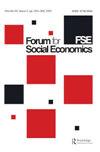Financialized Classification Systems and Public Policy: An Interdisciplinary Approach to Crisis Response
IF 1.2
Q4 ECONOMICS
引用次数: 0
Abstract
We utilize classification systems research to examine the disproportionate impact of COVID-19 on marginalized communities and the failures of policy makers to adequately respond to those most in need. Classification situations are individual positions within the market, generated via the mass collection and aggregation of individual financial and behavioral data, that are used to categorize people into price-differentiated opportunities. In a financialized economy, where profits are increasingly accumulated through financial channels, thereby entrenching the role of financial institutions and motives at the center of economic activity, one's classification situation operates to maximize value for shareholders. Importantly, in a neoliberal economy, where the logic of the market is used to guide social and political policy more broadly, classification situations are the mechanism by which individuals are allocated resources, opportunities, hardships, and other socio-political economic outcomes. In this paper we argue that the fiscal and monetary responses to COVID-19 were designed to support financialized interests and, as a consequence, the resources and protections of the state were allocated not to those most at risk but, rather, to those whose classification situation promised a stronger return on investment. © 2023 The Association for Social Economics.金融化分类系统与公共政策:危机应对的跨学科方法
我们利用分类系统研究来审查COVID-19对边缘化社区的不成比例的影响,以及政策制定者未能充分应对最需要帮助的群体。分类情况是通过大量收集和汇总个人财务和行为数据而产生的市场中的个人头寸,用于将人们分类为价格差异化的机会。在金融化的经济中,利润越来越多地通过金融渠道积累,从而巩固了金融机构和金融动机在经济活动中心的作用,一个人的分类情况是为了最大化股东的价值而运作的。重要的是,在新自由主义经济中,市场逻辑被用于更广泛地指导社会和政治政策,分类情况是分配个人资源、机会、困难和其他社会政治经济结果的机制。在本文中,我们认为,应对COVID-19的财政和货币措施旨在支持金融化利益,因此,国家的资源和保护没有分配给风险最大的人,而是分配给了那些分类状况有望获得更大投资回报的人。©2023社会经济协会。
本文章由计算机程序翻译,如有差异,请以英文原文为准。
求助全文
约1分钟内获得全文
求助全文

 求助内容:
求助内容: 应助结果提醒方式:
应助结果提醒方式:


